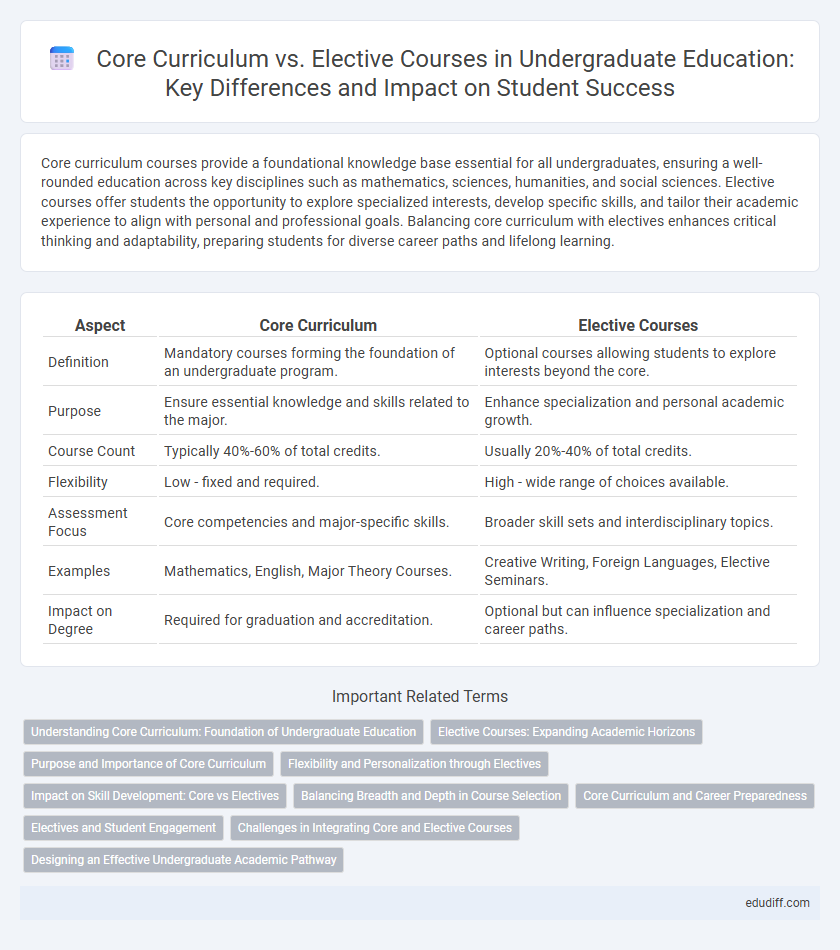Core curriculum courses provide a foundational knowledge base essential for all undergraduates, ensuring a well-rounded education across key disciplines such as mathematics, sciences, humanities, and social sciences. Elective courses offer students the opportunity to explore specialized interests, develop specific skills, and tailor their academic experience to align with personal and professional goals. Balancing core curriculum with electives enhances critical thinking and adaptability, preparing students for diverse career paths and lifelong learning.
Table of Comparison
| Aspect | Core Curriculum | Elective Courses |
|---|---|---|
| Definition | Mandatory courses forming the foundation of an undergraduate program. | Optional courses allowing students to explore interests beyond the core. |
| Purpose | Ensure essential knowledge and skills related to the major. | Enhance specialization and personal academic growth. |
| Course Count | Typically 40%-60% of total credits. | Usually 20%-40% of total credits. |
| Flexibility | Low - fixed and required. | High - wide range of choices available. |
| Assessment Focus | Core competencies and major-specific skills. | Broader skill sets and interdisciplinary topics. |
| Examples | Mathematics, English, Major Theory Courses. | Creative Writing, Foreign Languages, Elective Seminars. |
| Impact on Degree | Required for graduation and accreditation. | Optional but can influence specialization and career paths. |
Understanding Core Curriculum: Foundation of Undergraduate Education
Core curriculum courses establish the foundational knowledge and skills essential for undergraduate education, covering critical areas such as mathematics, science, humanities, and communication. These courses ensure a well-rounded academic experience by promoting interdisciplinary learning and critical thinking, preparing students for advanced studies and diverse career paths. Elective courses complement this foundation by allowing students to explore specialized interests and develop expertise in specific fields.
Elective Courses: Expanding Academic Horizons
Elective courses in undergraduate programs offer students the opportunity to explore diverse academic fields beyond the core curriculum, fostering interdisciplinary knowledge and critical thinking. These courses enable personalized learning experiences, allowing students to tailor their education according to their interests and career goals. By expanding academic horizons, electives enhance adaptability and creativity, essential skills in today's dynamic job market.
Purpose and Importance of Core Curriculum
Core Curriculum forms the essential foundation of undergraduate education by ensuring all students acquire critical skills and broad knowledge across key disciplines like humanities, sciences, and social sciences. This standardized framework promotes intellectual versatility, cultivates critical thinking, and prepares students for diverse career paths by grounding them in fundamental concepts. Its importance lies in creating a cohesive academic experience that fosters well-rounded intellectual development beyond specialized study.
Flexibility and Personalization through Electives
Elective courses provide undergraduate students with flexibility to tailor their education according to individual interests and career goals, enhancing personalization beyond the predetermined core curriculum. Core curriculum ensures a foundational knowledge base across essential disciplines, while electives enable exploration of specialized fields, fostering diverse skill sets. This balance allows students to develop a broad academic foundation while pursuing unique academic passions and professional aspirations.
Impact on Skill Development: Core vs Electives
Core curriculum courses establish foundational knowledge and essential skills critical for academic success and professional readiness in undergraduate studies. Elective courses enhance specialization and foster diverse capabilities by allowing students to explore interests outside their major, promoting adaptability and creative problem-solving. The combination of core and elective courses ensures a balanced skill set, integrating essential competencies with personalized areas of expertise.
Balancing Breadth and Depth in Course Selection
Core curriculum courses provide a foundational knowledge base essential for developing critical thinking and interdisciplinary skills across key academic areas. Elective courses allow undergraduates to explore specialized interests and deepen expertise in specific fields, fostering academic passion and career readiness. Balancing these choices enhances intellectual versatility while cultivating focused competencies critical for future success.
Core Curriculum and Career Preparedness
Core curriculum courses build foundational knowledge and critical skills essential for career readiness across diverse industries. These structured classes emphasize communication, quantitative reasoning, and ethical decision-making, which employers consistently value. Mastery of core subjects enhances adaptability and equips undergraduates with a competitive edge in the evolving job market.
Electives and Student Engagement
Elective courses offer undergraduate students the flexibility to explore diverse subjects beyond the core curriculum, fostering personalized academic growth and enhancing critical thinking skills. These courses increase student engagement by allowing learners to align studies with their interests and career goals, promoting active participation and intrinsic motivation. Research indicates that electives contribute to higher retention rates and a more dynamic college experience by encouraging interdisciplinary learning and creativity.
Challenges in Integrating Core and Elective Courses
Integrating core curriculum and elective courses poses challenges such as aligning learning outcomes while maintaining academic rigor and student engagement. Core courses emphasize foundational knowledge essential for degree requirements, whereas electives offer specialization and personal interest, making cohesive curriculum design complex. Effective integration demands careful curriculum mapping and collaboration among faculty to ensure a balanced, comprehensive educational experience.
Designing an Effective Undergraduate Academic Pathway
Designing an effective undergraduate academic pathway requires balancing core curriculum and elective courses to ensure foundational knowledge and personalized skills development. Core curriculum courses provide essential competencies in critical thinking, communication, and discipline fundamentals, while elective courses enable exploration of specialized interests and interdisciplinary connections. Strategic selection of electives aligned with career goals enhances academic engagement and post-graduate opportunities.
Core Curriculum vs Elective Courses Infographic

 edudiff.com
edudiff.com